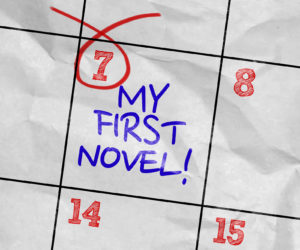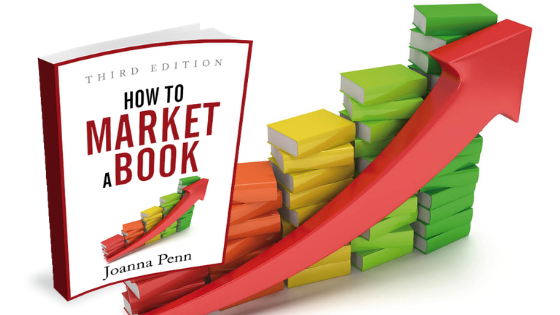“Marketing is figuring out who wants to buy what you're selling, then making sure they're aware it exists.” Chris Fox, Launch to Market
People often get hung up on the book launch for marketing.
A launch can be important, but also important is long-term marketing that you can do for your entire career. After all, it's far better to sell millions of books over the long term than get hung up on a few thousand over launch week.
This is an excerpt from How to Market a Book Third Edition, available now in ebook, print and audiobook formats.
The launch period is mainly about overcoming the inertia of a new book with no sales history, as well as trying to hit bestseller lists if that's appropriate.
But the real sales are likely to happen over time, so don't be disappointed if your launch results are lower than expected. It may be that a relaunch when your next book comes out is more effective, because a book is new to the reader who has just found it anyway. You get to choose what you do for your book.
Even if your book is traditionally published, you can work alongside the assigned publicist to make the launch even better.
Why the obsession with book launches?
Traditionally, publishers have focused on their front-list titles, books they market hard on launch before they move onto the next book. The turnover in a bookstore is usually 4-6 weeks, or 8-12 weeks for hardback. That's not very long to grab an audience and get them to buy. The publisher may even pulp the books that aren't sold in this period, or bulk sell them as remainders, so the initial launch period has always been critical for success.
But now we have unlimited shelf space with online stores. New readers can discover your books every day. They can buy the ebook, audiobook or print book online and there's no out-of-print and no pulping with print-on-demand. The books are always available, so you don't have to go into scarcity mode and try to sell them all in the first two weeks.
You can cultivate an abundance mentality where everyone you connect with can buy your books, whenever they hear about you. Every sale goes into the algorithms and creates on-going sustainability with a long-term payoff.
Of course, it's still a good idea to do some launch activities to get your book moving. Here are some elements that you could consider.
3 – 6 months before launch
Decide on your definition of success and your budget in terms of time and money.

Or you could write some guest blog posts and schedule an online book launch party with giveaways, plus use Facebook ads to reach readers of similar books. This will cost a lot less money and (most likely) be a lot more effective than TV ads these days.
If you're self-publishing, you need to choose whether you will go exclusive with KDP Select, because that will impact where to focus your launch.
Plan your dates
If you're traditionally published, you won't have much choice on your book launch period, but if you're self-published, you get to determine your dates. Although the book will become available to buy on one particular day, you should plan on several weeks of focused promotion to allow for momentum in the charts.
Reserve your slots for guest blogging, interviews, blog book tours, or anything else you're arranging with other sites. If you're working with a publicist, help them organize media opportunities as well as booking advertising slots and paid reviews like Publishers Weekly.
Block out your schedule so that you have time to do all the promotion, and get enough rest. Pretty much every author I know gets exhausted at launch time!
Build relationships with authors and influencers in your niche
If you start commenting or tweeting or sharing other people's books or content, you can start to build a relationship with them over time. This goes back to social karma, but basically, you are far more likely to get a guest blog spot or podcast interview or email to their list if you build a relationship before pitching. Start by networking with your own peer group and then build up to connecting with influencers if you can.
Build your email list and your Street Team.
Even if you're just starting out, chances are this won't be your last book! Your list will start small, but over time, you can build it up and then you can ask a sub-set to join your Street Team.
Sort out your book fundamentals
These include the book cover, sales description, keywords and categories, as well as understanding the target market for your book. You will need all these elements for your launch and on-going marketing, and they are critical for success.
Set up pre-orders if appropriate
Pre-orders are available on all the ebook stores and can also be done for print books through Ingram Spark. You can set them up to 90 days in advance on Amazon and up to a year on Apple Books and Kobo, even if you don't have a cover.
The benefits of pre-orders include the ability to start marketing early, get double sales ranking on iBooks, which counts sales before and after launch, visibility on lists on Amazon, Kobo and other sites, and early population of also-boughts.
It also means you can get everything organized before your launch, which can help if you have a lot of other activities organized. Authors who choose to publish wide will often have pre-orders on iBooks, Kobo and Nook months in advance but will only set one up on Amazon a few days before in order to concentrate the ranking there.
It's not worth using pre-orders if you're putting out your first book or have a very small audience, but it can be useful for later books in a series, or if you already have an audience waiting for your work.
One month before launch
- Set up your book page and links on your author website with pre-order links if appropriate
- Send out your Advanced Reader Copies with the dates that you will need the reviews.
- Prepare and send any guest articles or marketing material you promised to other bloggers, authors or reviewers, so it is all done in advance
- Prepare or commission any promotional images or advertising that you need
One week before ‘official' launch
It's a good idea to do a soft launch in order to sort out your metadata and get initial reviews, before telling the wider world that your book is available. This is harder if you have set up pre-orders, but it's worth scheduling any promotional spike activities for at least a week after the book is on sale to make sure everything is working correctly.
This is especially useful if you are new to self-publishing, because you're not used to the way things work, and it takes a few hours for changes to go through.
Add your links to your book page and Goodreads and any other sites like BookBub. I use BookLinker.net to create a global URL for Amazon that includes my affiliate tags, but you can also set up a universal link at www.books2read.com
Claim your book through Amazon Author Central, so it is linked to your author name
Reformat or tweak your sales description to make it look good and add any extra metadata. Check your pricing and the Look Inside.
Buy your book so you can check for any issues with interior formatting. You can always upload a new version if there are problems.
Email your Street Team or early reviewers and remind them to add early reviews.
On launch day
Drive readers to your book sales page. This might include:
- Emailing your list with buy links
- Using Facebook ads, Amazon ads or other paid advertising
- Scheduling a promotion on email blast sites
- Adding images and quotes on social media
- Collaborating with other authors for co-promotion on social media, competitions, giveaways or email lists
- Doing podcasts and guest posts around your book. This is still very effective for non-fiction in particular
- PR and media appearances
- Live events and speaking
Basically, anything else you can think of that will get your book some attention when it goes live.
You can also encourage your audience to buy in launch week by offering a lower price or bonuses for a limited time. Building your list is the best way to control sales to readers who love your work. Offering it to them at a lower price for an initial period is both a reward for supporting you and a way to ensure sales in a specific period. For example, a full-price novel at $4.99 could launch to your list at 99c for three days before you raise the price.
Have a book launch party or event
Many authors dream of the book launch party: Champagne, toasts to the literary genius and crowds of eager readers buying hundreds of books. But in reality, the book launch party is more about rewarding yourself for a job well done, a celebration of a goal achieved, rather than a way of marketing and selling your book.
If you're going to have one, then fantastic! Make sure your friends come along and have a great time, sign some books and enjoy yourself. Take lots of pictures and share them on social media. Maybe even hire a pro photographer to make sure you get some good shots to use in your marketing, but understand that the launch party is not a book marketing technique, but more of a fun time to celebrate.
I've never had a physical book launch party, but one day when I have written more books and achieved my own definition of success, I intend to have more of an author career celebration when I will spend some serious money and have a serious party. Bring it on!
You could also put on a useful or entertaining event that just happens to have a book launch incorporated.
Non-fiction author Trevor Young did a social media strategy event for entrepreneurs featuring a panel of well-known bloggers giving valuable advice. As part of the evening, Trevor also launched his book, MicroDomination. People came for the event but left with a copy of his new book.
A physical launch event is location-specific and will only impact sales locally. But these days we can sell to a global audience, so doing an online launch is likely to generate more sales.
Some authors have virtual launch parties on Facebook and invite their readers, offering giveaways and gift cards. They spend several hours chatting with fans, creating a party atmosphere that people can join virtually from all over the world.
Online marketing launch activities like articles, interviews, podcasts, and videos will stay online for the long term, so they provide long-tail traffic and hopefully sales into the future.
Take screen prints of your chart position
I have pictures of my books next to Lee Child, Stephen King, James Patterson and other big-name authors that look great as social proof. If you have published direct on platforms like KDP and Kobo, you'll also be able to watch the sales figures spike, although remember that it can take a few hours to kick in.
After the launch
Thank everyone who was involved, including your readers, bloggers and reviewers. Foster those relationships for next time and make sure that you try to help other people out with their launches too.
Write down anything that was particularly effective and anything that was a waste of time or energy. Reflect on your definition of success and what you can learn from the experience, then put some of your long-term marketing activities into place, so your sales continue over time.
Remember, there are many different ways to launch
Earlier this year, a British author had an exclusive launch party on the Grand Canal in Venice, paid for by her publisher. She was in the national press, sold a lot of books and hit the bestseller lists. But that's not the reality of most book launches for most authors.
When I launch a new book, I set up pre-orders, get early reviews from my Street Team, do an email blast and run paid ads over launch week. I focus a lot more on continuous long-term marketing and spike sales of older books than I do on launching new ones.
So make an effort during your launch, but remember, it's just the start of your book marketing journey.
This is an excerpt from How to Market a Book Third Edition, available in ebook, print and audiobook formats.


